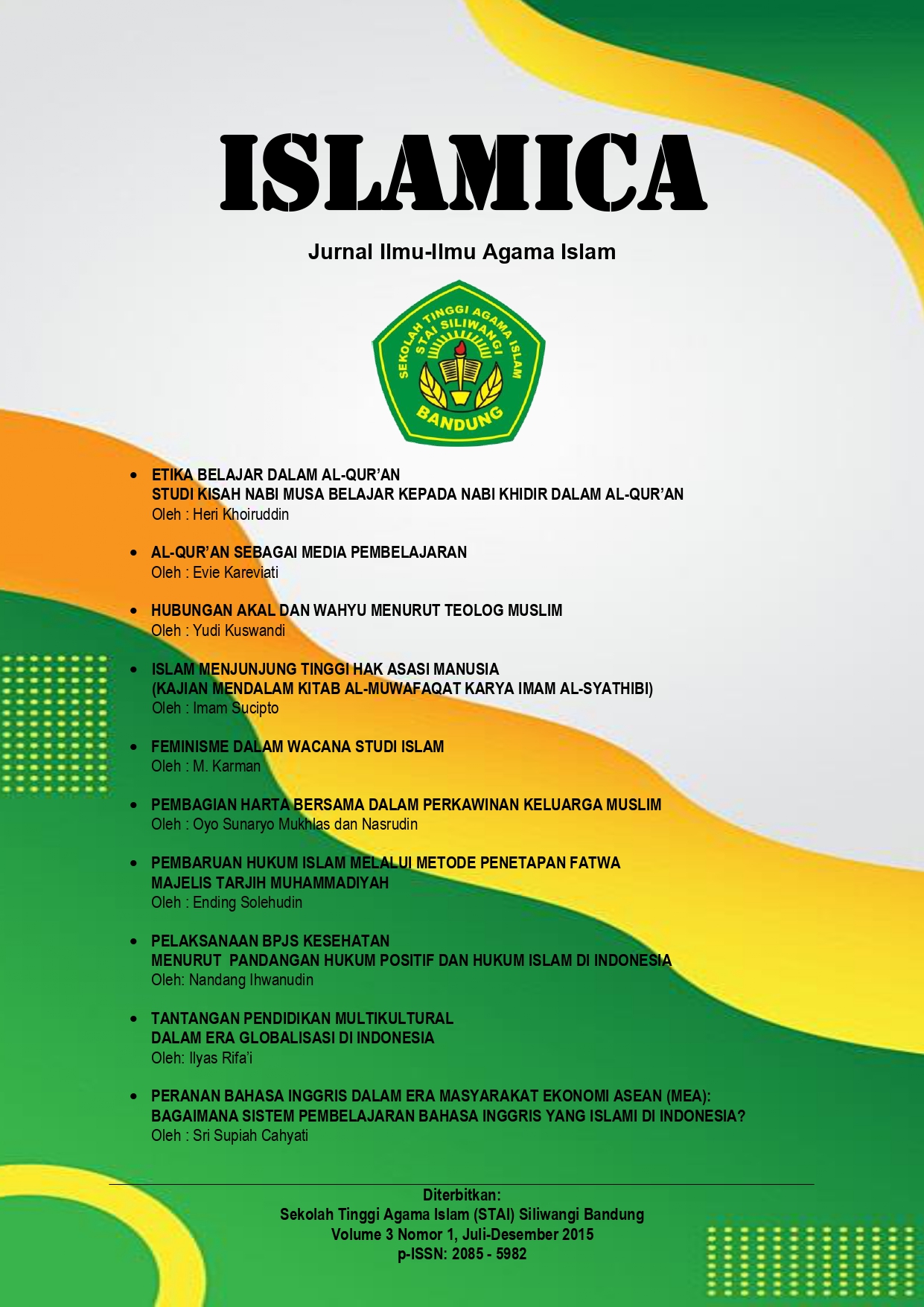Pembagian Harta Bersama Dalam Perkawinan Keluarga Muslim
DOI:
https://doi.org/10.59908/islamica.v3i1.39Keywords:
joint property, congenital property, marriageAbstract
Legal values that live in the community, including customs are having very big influence on the formation of the formulation of joint property as stipulated in article 85 to article 97 Compilation of Islamic Law. The formulation of joint property was carried out through the approach path syirkah Abdan rules and customs. The formulation of joint property or the more viscous is also called the treasure-rich mixed-rajakaya that can occur when a person is bound by marriage. With matrimony, then the income will be shifted according to attach obligations and rights as husband and wife. Wife’s Income unanimously regarded as the property of origin, because the wife is not burdened with providing for her husband. However, upon mutual agreement, especially the wife sincerity and husband’s permit, the wife can be a partner/companion in making a living. While the husband’s income is a capital property to make a living for his family, because the husband obligated to provide including for his wife. Thus, the formalization of joint property arrangements in marriage law in Indonesia was essentially aims to provide a balanced appreciation (proportional) to the conjugal cooperation in building and maintaining the household. If the judges in deciding section treasure together for the widower and divorcee living using Abdan syirkah rules and customary law, as well as methods of discretion, or ijtihad with the approach of the rules istinmbat al Ahkam, not a violation of law, it can even be appreciated as a progressive legal invention. Given the essential meaning of the provisions of Article 97 KHI is set (degelen) is not forcing (dwigen).
References
Agus Dwiyanto dkk, Reformasi Birokrasi Publik di Indonesia, (Yogyakarta: Galang Pritika, 2002)
Anonimous. Kumpulan Peraturan Perundang-undangan dalam Lingkungan Peradilan Agama, (Surabaya: PTA, 1992), hlm. 367.
Boy Chandra Seroza. Pembagian Harta Bersama Secara Proporsional Antara Suami Usteri (Upaya Mewujudkan, Keadilan, Kepastian dan Kemanfaatan).
Eman Suparman, HukumWaris Indonesia dalam Perspektif Islam, Adat dan BW, (Bandung: Refika Aditama, 2005).
Ibn Qayyim al-Jauziyah, ‘Ilam al-Muwaqi’in, (Beirut: Dar al-Fikri, t.th).
M. QuraishShihab, , Tafsir al-Mishbakh, (Jakarta: Lentera Hati, 2002).
Muhammad Abu Zahrah. Alih Bahasa Saefullah. Usul Fikh. (Jakarta . Pustaka Firdaus 2007).
Muhammad Bin Abdullah Abu Abdillah Al-hakim Anasa’i. Almustadrok Ala Shoheh Li al- Hakim ma’a Ta’liqoti Al- Dzahabi fi Al-Takhlis (VCD Maktabah as-Samilah).
Muhammad Ma’shum, Ilmu Ushul Fiqh, (Jombang : Darul Hikmah, 2008).
Muhibindan Abdul Wahid, Hukum Kewarisan Islam Sebagai pemburan Hukum Positif di Indonesia, (Jakarta: SinarGrafika, 2009)
Otje Salman, HukumWaris Islam, (Bandung: RefikaAditama, Bandung, 2001)
.Ratno Lukito, Pergumulan Antara Hukum Islam Dan Adat di Indonesia, (Jakarta: INIS,1998).
Sabian Utsman, Menuju Penegakan Hukum Responsif, (Yogyakarta: Pustaka Pelajar, 2008).
Satjipto Rahardjo, Membedah Hukum Progresif, (Jakarta: Kompas Media Nusantara, 2008).
Sayuti Thalib, HukumKekeluargaan Indonesia, (Jakarta: UI Press, 1981).
Sayyid Sabiq. Fiqh al Sunnah.(Beirut: Al-Asriyah, 2011).
Shidarta.Putusan Hakim: Antara Keadilan, Kepastian Hukum, dan Kemanfaatan,dalam Reformasi Peradilan dan Tanggung Jawab Negara (Jakarta: Komisi Yudisial, 2010).
Soerjono Soekanto, Pokok-Pokok Sosiologi Hukum, (Jakarta: RajaGrafindo Persada,2006).
Yahya Harahap. Kedudukan Kewenangan Dan Acara Peradilan Agama UU No. 7 Tahun 1989, (Jakarta. Sinar Grafika 2009).
Yan Pramadya Puspa, Kamus Hukum, (Semarang: Aneka Ilmu, 2004)
Zain al-Din’Abd al-Aziz al-Malibariy, Fath al-Mu’in, Penerbit. Toha Putra, Semarang, Abd ar-Rahman al-Jazari . Al-Fiqih ‘Ala Madzahib al- Arb’aah (Beirut: Darul Fikr, 1999).
Downloads
Published
How to Cite
Issue
Section
License
Copyright (c) 2015 Oyo Sunaryo Mukhlas, Nasrudin

This work is licensed under a Creative Commons Attribution-ShareAlike 4.0 International License.


